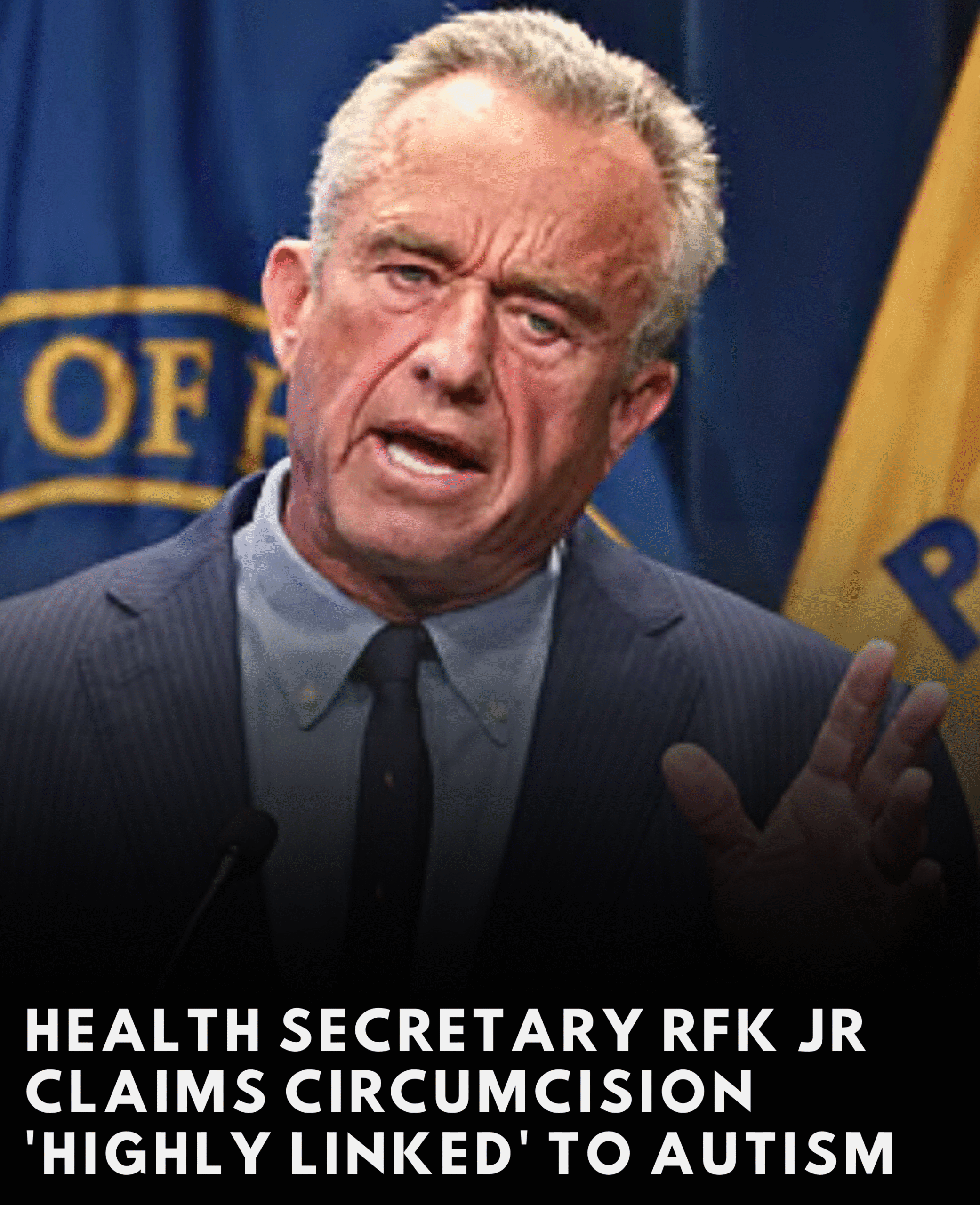Health and Human Services Secretary Robert F. Kennedy Jr. asserted during a White House Cabinet meeting on Thursday that circumcision is “highly likely” to be linked to autism in boys, claiming the association stems from acetaminophen (Tylenol) administered after the procedure, remarks that immediately drew sharp rebuttals from medical experts, autism advocates and religious leaders.…
Health and Human Services Secretary Robert F. Kennedy Jr. asserted during a White House Cabinet meeting on Thursday that circumcision is “highly likely” to be linked to autism in boys, claiming the association stems from acetaminophen (Tylenol) administered after the procedure, remarks that immediately drew sharp rebuttals from medical experts, autism advocates and religious leaders. Seated beside President Donald Trump, Kennedy said “infant boys who are circumcised have double the rate of autism,” framing the assertion as part of a broader push by the administration to warn Americans against acetaminophen use in pregnancy and infancy and to fund new inquiries that he said would “make the proof.” Trump amplified the message in the meeting, telling viewers, “Don’t take Tylenol if you’re pregnant and when the baby is born, don’t give it Tylenol.”
Kennedy, who for years has promoted fringe theories about autism, told the meeting there were “two studies that show children who are circumcised early have double the rate of autism” and added, “It’s highly likely because they’re given Tylenol,” without specifying the research. He also described seeing a TikTok video of a pregnant woman “gobbling Tylenol,” and said of critics, “The level of Trump derangement syndrome has now left the political landscape and now [is] in the realm of pathology.” “It is not proof,” Kennedy said of his claims. “We’re doing the studies to make the proof.”
The Cabinet appearance followed a September 22 announcement in which the White House and HHS said FDA would begin a process to update acetaminophen labeling and issue a physician notice about potential neurodevelopmental risks, while emphasizing conflicting evidence and the need for clinicians to use the lowest effective dose for the shortest duration if treatment is required. The same briefing promoted a new NIH Autism Data Science Initiative and a step to recognize folinic acid (leucovorin) for a subset of autism-related speech deficits, framed by officials as a limited therapeutic pathway rather than a cure. Thursday’s Cabinet remarks extended that agenda into a new claim about circumcision that the department had not previously highlighted.
Major medical organizations and researchers countered the Cabinet-room assertions with recent evidence reviews and large-scale studies finding no causal link between acetaminophen exposure in utero and autism. A population-based sibling-control study published in JAMA last year—covering 2.48 million children born in Sweden—found that the modest associations seen in conventional models disappeared when comparing exposed and unexposed siblings, indicating familial confounding rather than drug effect. NIH summarized the work as showing “no causal link” between prenatal acetaminophen and autism, ADHD or intellectual disability. The American College of Obstetricians and Gynecologists has advised that acetaminophen remains appropriate in pregnancy when clinically indicated, given the known risks of untreated fever and the harms of alternatives such as NSAIDs.
Kennedy’s circumcision assertion appeared to echo a 2015 Danish registry cohort study that followed more than 340,000 boys and reported higher rates of autism diagnoses—especially before age five—among those circumcised, with authors hypothesizing that early-life pain and stress could play a role. The paper did not measure analgesics or anesthetic use and could not address acetaminophen exposure. Subsequent critiques argued the analysis relied on small subgroups and unmeasured confounding, and other researchers emphasized that the design could not establish causation. Even coverage of the Cabinet meeting by wire services noting the study also highlighted that it lacked data on painkillers and that other studies have not supported a circumcision–autism link.
Kennedy and Trump’s comments drew immediate pushback from scientists invited by international outlets to assess the claims. “None of this makes sense,” said Helen Tager-Flusberg, a Boston University autism specialist, adding that “none of the studies have shown that giving Tylenol to babies is linked to a higher risk for autism once you can control for all the confounding variables.” David Mandell, a psychiatrist at the University of Pennsylvania, called the 2015 circumcision paper “riddled with flaws,” pointing to sample limitations and likely bias introduced by hospital-based circumcision among medically complicated children.
Tylenol’s parent company, Kenvue, responded that “independent, sound science clearly shows that taking acetaminophen does not cause autism,” calling the officials’ claims “deeply concerning” for expectant mothers who may be discouraged from treating fever and pain—a position in line with mainstream obstetric guidance that regards acetaminophen as one of the few options considered safe in pregnancy when used appropriately. The company’s statement followed Kennedy’s remark at the meeting that he would personally oversee studies to “make the proof,” a pledge he has repeated since setting a self-imposed deadline this year to identify autism causes.
Autism organizations said the episode risked stigmatizing autistic people and distracting from urgent care and access issues. The U.K.’s National Autistic Society called the health secretary’s new circumcision claim “more dangerous anti-science,” saying it “is not based on any form of rigorous, robust research and could put lives at risk.” The group warned that “this incessant focus on pseudo-scientific causes of autism means autistic people are forced to listen to the suggestion that they need to be cured,” and urged attention to long waiting lists for diagnosis, pressures on special educational needs provision and low employment rates among autistic adults.
The political fallout extended beyond the scientific debate. Representative Jerry Nadler, a New York Democrat who is Jewish, called Kennedy’s circumcision remarks antisemitic, urging bipartisan condemnation in a statement on X. Circumcision is a religious requirement in Judaism and Islam and also widely practiced in the United States. Kennedy did not specify which studies he relied upon for the “double the rate” assertion, and neither HHS nor the White House provided supporting citations after the meeting.
Thursday’s Cabinet remarks capped weeks of escalating rhetoric from the administration linking acetaminophen to autism. In late September, the administration said FDA would move toward label changes to reflect “potential” associations flagged in some observational research, even as federal summaries and peer-reviewed analyses stressed the limits of those studies and the importance of treating maternal fever. The initiative is paired with new NIH funding lines focused on data integration across genetics, environmental exposures and clinical phenotypes, and with an HHS communications push that officials say will “restore trust” while critics warn it risks the opposite by promoting unsupported claims from the top of the health department.
Kennedy’s Cabinet-room presentation also included a misstatement about female anatomy—describing a pregnant woman “gobbling Tylenol with her baby in her placenta”—that underscored concerns among clinicians about the scientific grounding of his remarks. At the same time, he characterized those who rebut his theories as motivated by animus toward the president, saying opposition is fueled by “hatred for President Donald Trump.” In the meeting, he explicitly acknowledged the lack of proof, telling colleagues, “It is not proof. We’re doing the studies to make the proof.”
Beyond Thursday’s exchange, Kennedy’s tenure as health secretary has been marked by controversies over vaccines and autism policy. A longtime vaccine skeptic and founder of Children’s Health Defense before entering government, he has made finding environmental and pharmaceutical drivers of autism a signature priority and has proposed building a national registry of autistic people using private medical records—plans that have alarmed civil liberties groups and many clinicians. He was sworn in as HHS secretary on February 13, 2025, after a narrow Senate vote, and immediately launched a “Make America Healthy Again” initiative whose early actions included reshaping advisory panels and cutting some research grants, moves that have drawn criticism from past public health leaders.
The evidence on circumcision and autism remains limited and contested. The 2015 Danish study, often cited by proponents of a link, reported a hazard ratio of 2.06 for “infantile autism” before age five among circumcised boys but could not address medications given around the procedure, and critics argued the associations might reflect differential healthcare contact or cultural practices rather than biological effects of pain or acetaminophen. No randomized or quasi-experimental studies have established a causal pathway involving neonatal analgesia and autism diagnoses, and large reviews have found no consistent neurodevelopmental harms attributable to circumcision itself.
By contrast, the prenatal acetaminophen literature is now dominated by the sibling-control analysis that failed to detect increased autism risk, a design specifically intended to mitigate unmeasured family-level confounding that can distort conventional cohort findings. Obstetric groups reiterate that untreated fever in pregnancy is itself associated with adverse outcomes and that, when medication is needed, acetaminophen remains the preferred option over NSAIDs, which carry known fetal risks later in gestation. As Thursday’s meeting ended, the administration had not released protocols or timelines for the studies Kennedy said he would direct, while companies and clinicians cautioned against policy or behavioral changes that are unsupported by high-quality evidence.
Kennedy’s focus on circumcision, inserted into a televised policy discussion on drug labels and autism research funding, expanded the scope of a debate he and the president have steered for weeks—one that has pitted White House messaging against mainstream clinical guidance and large-scale epidemiology. With autism advocates warning of stigmatization and religious leaders bristling at implications for a long-standing ritual, the immediate impact of his claim has been to intensify scrutiny on the administration’s handling of science in public communication and to raise new questions about how, and on what basis, federal health leaders will advise families about common procedures and medications.



